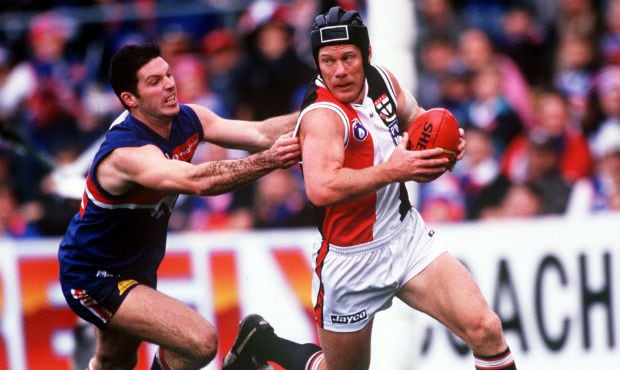TWENTY years go, St Kilda historian Russell Holmesby documented his top 20 Saints of all time. Before the days of social media and comment streams at the foot of online articles, the list wasn't as widely publicised as it would have been in today's world.
Since then, the Saints have played in four Grand Finals and produced some of the greatest players of the modern era, leading Holmesby to extend his list by five.
This is Russell Holmesby's top 25, rankings 20-16.
Click HERE to view the original top 20.
Click HERE to view players ranked 25-21.
20. Brian Gleeson (16)
Born: November 3, 1934
Debut: Round 1, 1953
Games: 70
Goals: 47
Height: 188cm
Weight: 82kg
His story is the most tragic footballing fate that befell any Brownlow Medallist. After winning the 1957 medal at 22 years of age and being appointed captain of St Kilda for 1958, he injured a knee in a practice game and never played again. His brother Terry had been signed by "Checker" Hughes who told Brian to come down for a run in the thirds.
Les Foote took him to St Kilda from Berrigan and he had also gained a valuable grounding at St Pat's, Ballarat. He spent much of his early career at centre half-forward where his great high marking ability made him an asset. Gradually he developed into a fine ruckman with the knack of directing hitouts unerringly.
He had extraordinary ground ability and in 1957 was best afield week after week, representing Victoria in four games. In 1962 he coached Queensland side Coorparoo after he had moved there in business, and was cajoled into playing for half a season.
COMING SOON: Russell Holmesby's 15-11 rankings. Friday January 2.
19. Vic Cumberland (15)
Born: July 4, 1877
Died: July 5, 1927
Debut: Round 15, 1898
Games: 176 (126 St Kilda, 50 Melbourne)
Goals: 87
Height: 182cm
Weight: 82kg
Known by modern fans as simply the oldest man to play League football at the age of 43, he deserves to be remembered as much more than a football oddity. He was a giant of his era which spanned almost 30 years as a senior player. Born in Toorak, he made his name as a footballer in Tasmania.
Although just under six feet tall he was a follower by instinct with great skill and endurance. In August 1898 he moved to St Kilda to live and play with the local side. When filling in for a junior side he was spotted by the Melbourne secretary and he was snapped up.
With McGinis and Moodie he formed a famous ruck and they led the way in the 1900 premiership success. A year later Cumberland tried to cross to St Kilda, but had to play for the Collegians because of a clearance hold-up in 1902. When he finally joined the Saints he lifted the club, but in mid 1904 he left for New Zealand and helped set up the game there.
RELATED: The oldest player that ever was
18. Nathan Burke ( - )
Born: February 6, 1970
Debut: Round 7, 1987
Games: 323
Goals: 124
Height: 180cm
Weight: 85kg
The former Pines boy was destined to lead St Kilda almost from the time he stepped onto the field in a St Kilda jumper. He made the transition from under-19s to seniors in the space of six weeks in 1987 and was the consummate team man. When his father told him to stay in his place on a wing in the under-9s he never moved more than 10 yards! He was a winger when he began with the Saints and after a few years was placed in the back-pocket.
It taught him to tighten his defensive skills and he was fierce in his tackling and smothering which stood him in good stead when he returned to on-ball duties. His boundless enthusiasm for football emanated from his father Barry who was a solid performer with VFA club Sandringham. Burke's head-down style saw him cop plenty of knocks and problems with blurred vision led him to use a helmet.
One of his worst knocks came in the 1991 elimination final when he was struck away from play by Gary Ablett. He made his Victorian debut in 1992 after two false starts when he had been called up to the squad only to be left out at the last minute. After that he played nine state games and became one of Victoria's first choices.
In 1996 he had such a fine season that he ranked in the League's top ten in disposals, clearances from the centre, kicks, tackles and shepherds. He came third in the Brownlow and won a best and fairest to add to the one he had earned in 1993. When he reached the 200 game mark at 26 he was the fourth youngest man to do so.
The youngest, Russell Greene, also came from Burke's original club Pines. Throughout St Kilda's heroic 1997 campaign he played with a broken thumb. A protective guard and anaesthetic before each match enabled him to continue and he still polled well in the Brownlow.
He was appointed St Kilda's co-captain with Stewart Loewe in 1996 and the pair led the side in the 1997 Grand Final. He took over as skipper in his own right in 1999 under new coach Tim Watson. In 1999 he won his third best and fairest award.
Before the 2001 season Burke was replaced by his good friend Robert Harvey as captain, when coach Malcolm Blight sought to have a changing of the guard. Just after reaching his 300 game milestone Burke injured a knee which sidelined him for the remainder of the season. In 2002 his sudden problem with injury struck again when he injured a knee just three games into the season.
Burke was a steady performer in defensive roles in 2003 despite some unwarranted media criticism. Burke retired in memorable circumstances with a hefty win over Richmond late in the year. He played 11 state of origin games for Victoria.

Nathan Burke evades Rohan Smith.
17. Wels Eicke (14)
Born: September 27, 1893
Died: February 10, 1980
Debut: Round 15, 1909
Games: 218 (197 St Kilda, 21 North Melbourne)
Goals: 61
Height: 177cm
Weight: 74kg
Wels Eicke came to notice as a schoolboy champion swimmer and footballer and at the age of 15 years and 315 days made his debut for St Kilda - one of only half a dozen 15 year-olds to play League football. He was recruited from the Melbourne Swimming Club football team. He was a rover at first, but within three years established himself as one of the game's best defenders.
Although only 5'9" he had a tremendous spring and at Essendon in 1912 he was said to have taken one of the greatest marks of all time as he soared above a pack of 10 players. A brave player who was a fine kick, he represented Victoria eight times in a 10 year span starting as an 18 year-old. He skippered the Saints in 1919 and 1924 and in the latter year he was coach for part of the season.
He was appointed North's coach in the Roos' first two VFL years although he had returned to St Kilda by later 1926. He won the Saints' best and fairest in 1914 and 1915. A strong-willed individual he often crossed swords with others at St Kilda.
In one game in 1924 he called for a count of opposition players and it was revealed in later years that he had done it to let one of his players cool down. He quit St Kilda's committee in disgust in 1964 over the club's proposed move to Moorabbin.
16. Ross Smith (13)
Born: September 12, 1942
Debut: Round 2, 1961
Games: 234
Goals: 230
Height: 173cm
Weight: 71kg
Smith's career proved the value of persisting. Smith took several years to blossom as a rover although his courage and determination were never in doubt. He didn't make the Saints' senior list at first, but after a great game for the seconds he won promotion for the second round.
It wasn't until the preliminary final of 1966 that his career kicked into a higher gear. He starred in the Saints' win and was part of the flag side a week later. In 1967 he consistently turned in tireless roving displays and was a prolific kickwinner.
He earned his first Victorian guernsey and then bolted away to win the Brownlow with 24 votes. His improvement was illustrated by the fact that in six previous seasons he had scored only six votes. Smith won his second club championship in 1971 and was tipped to win a second Brownlow.
He played in the 1971 runner-up team that year. He captained the Victorian side at the 1972 carnival and led the Saints from 1970 to 1972. He then went to WA as coach of Subiaco for three years and coached the club to a flag.
He returned to St Kilda as assistant coach and was talked out of retirement when the club suffered injuries. He coached the Saints for a year in 1977.
.jpg)
Ross Smith with his 1967 Brownlow Medal.



